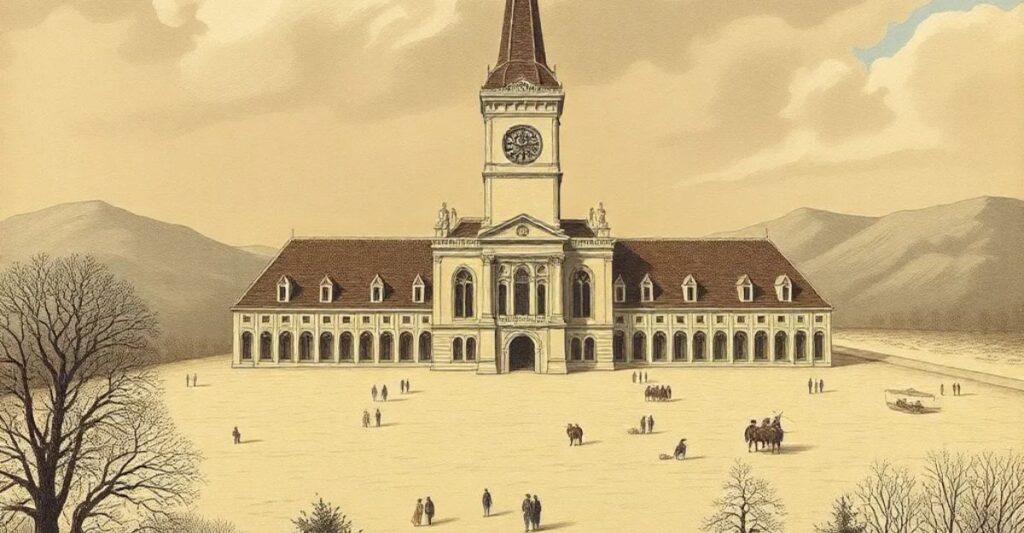Conrad Peutinger II 1475: The Renaissance Visionary Who Bridged Ancient Knowledge and Modern Thought

Introduction:
Conrad Peutinger II 1475 was a remarkable figure of the German Renaissance, renowned for his work as a scholar, diplomat, and cartographer. Best known for preserving the Tabula Peutingeriana, a medieval map of the Roman Empire’s road network, Peutinger’s efforts helped safeguard ancient knowledge and inspire future generations of historians and geographers. Born in Augsburg, Germany, his contributions spanned law, classical studies, and humanism, making him a true Renaissance polymath.
In addition to his cartographic achievements, Conrad Peutinger II played a vital role in promoting economic liberalism and classical studies. His intellectual legacy remains a cornerstone of historical scholarship, and his dedication to bridging the past and present continues to resonate in the modern era.
Who Was Conrad Peutinger II 1475? A Dive into His Legacy
Conrad Peutinger II 1475 was a Renaissance thinker from Augsburg, Germany, who made significant contributions to scholarship, law, and cartography. Known for his involvement in preserving the famous Tabula Peutingeriana, Peutinger’s work connected ancient knowledge to the modern world. His influence extended into politics and economics, where he promoted ideas of fairness and progress.
Born into a wealthy family, Peutinger had access to exceptional education and resources. He studied at top universities, including the University of Padua, where he excelled in law. This education prepared him to take on roles in diplomacy and governance, where he represented his hometown in European courts. His passion for learning and preserving history earned him a place among the most respected humanists of his time.
Peutinger’s legacy is not only about his accomplishments but also his vision. He believed in the power of knowledge to bridge cultural gaps and improve society. Today, historians and students continue to study his work to understand Renaissance ideals and their impact on modern thought.

Who Was Conrad Peutinger II 1475? A Dive into His Legacy
Conrad Peutinger II 1475 was a Renaissance thinker from Augsburg, Germany, who made significant contributions to scholarship, law, and cartography. Known for his involvement in preserving the famous Tabula Peutingeriana, Peutinger’s work connected ancient knowledge to the modern world. His influence extended into politics and economics, where he promoted ideas of fairness and progress.
Born into a wealthy family, Peutinger had access to exceptional education and resources. He studied at top universities, including the University of Padua, where he excelled in law. This education prepared him to take on roles in diplomacy and governance, where he represented his hometown in European courts. His passion for learning and preserving history earned him a place among the most respected humanists of his time.
Peutinger’s legacy is not only about his accomplishments but also his vision. He believed in the power of knowledge to bridge cultural gaps and improve society. Today, historians and students continue to study his work to understand Renaissance ideals and their impact on modern thought.
The Tabula Peutingeriana: Preserving Roman Knowledge
The Tabula Peutingeriana is one of the most iconic artifacts associated with Conrad Peutinger II 1475. This medieval map, which Peutinger preserved, showcases the Roman Empire’s road network, stretching across Europe, Asia, and North Africa. Unlike modern maps, it focused on travel routes, making it a vital tool for ancient travelers.
Peutinger did not create the map but ensured its survival by safeguarding it after it was passed to him by Konrad Celtes. His efforts in preserving this artifact demonstrate his dedication to history and cartography. Even though he didn’t publish it during his lifetime, the map gained fame later, highlighting its historical value.
This map is a testament to Peutinger’s commitment to connecting the past with the future. It helps us understand the vast infrastructure and vision of the Roman Empire. Historians today regard it as an invaluable document, offering insights into ancient transportation and trade.
Conrad Peutinger II 1475 and Renaissance Humanism
Conrad Peutinger II 1475 was deeply involved in the Renaissance humanist movement, which emphasized the revival of classical texts and values. He was part of a network of scholars who promoted learning, ethics, and civic responsibility. His work bridged the gap between ancient wisdom and modern governance.
Peutinger believed in the importance of education and intellectual exchange. He supported the study of Roman law, literature, and philosophy, which shaped his ideas in law and politics. His writings and diplomatic efforts reflected these values, making him a pioneer in spreading humanist ideals across Europe.
By preserving and promoting ancient texts, Peutinger ensured that Renaissance scholars could build on the knowledge of the past. His contributions to humanism inspired future generations to pursue learning and innovation. His life reminds us of the enduring power of education and cultural exchange.
Exploring the Life and Work of Conrad Peutinger II 1475
Conrad Peutinger II 1475 was a German scholar, humanist, and diplomat who lived during the Renaissance. Born in Augsburg, Germany, on October 14, 1475, Peutinger grew up in a prosperous family that valued education and civic engagement. From an early age, he was exposed to the flourishing cultural and intellectual climate of his city, which was a hub of trade and knowledge during the Renaissance.
Peutinger received a comprehensive education, studying at some of Europe’s most prestigious universities, including Padua and Bologna. His academic focus included law, classical literature, and philosophy. This education shaped his worldview, enabling him to become a well-rounded thinker and a prominent figure in humanist circles. His humanist ideals were evident in his work to revive classical knowledge and promote civic responsibility.
Apart from his academic endeavors, Peutinger held significant political roles in Augsburg. He served as a legal adviser and diplomat for the city, representing it in negotiations and imperial diets. His political career was marked by efforts to strengthen Augsburg’s position within the Holy Roman Empire while upholding Renaissance values of justice and intellectual inquiry. Peutinger’s life and work exemplify the Renaissance spirit of blending knowledge, governance, and cultural preservation. His contributions, from preserving ancient texts to influencing policy, continue to inspire historians and students today.
How Conrad Peutinger II 1475 Shaped Cartography and Classical Studies
One of Conrad Peutinger’s most notable achievements was his role in preserving the Tabula Peutingeriana, a medieval map that provides a detailed depiction of the Roman Empire’s road networks. Although Peutinger did not create the map, his efforts ensured its survival for future generations. The map, often referred to as the Peutinger Table, highlights the extensive infrastructure of ancient Rome, emphasizing the empire’s interconnectedness rather than geographical accuracy.
Peutinger’s interest in cartography stemmed from his humanist education and his belief in the importance of preserving ancient knowledge. The Tabula Peutingeriana was passed to him by Konrad Celtes, a fellow humanist, and Peutinger recognized its historical value immediately. He carefully preserved the map, understanding that it was a crucial link to understanding the administrative and logistical brilliance of the Roman Empire.
In addition to cartography, Peutinger made significant contributions to classical studies by collecting and studying ancient manuscripts. His work focused on Roman law, literature, and governance, reflecting his deep admiration for classical antiquity. Peutinger believed that the study of ancient texts could provide valuable lessons for modern governance and society. His contributions to both cartography and classical studies underline his dedication to bridging the gap between ancient and contemporary knowledge.
Conclusion
Conrad Peutinger II 1475 was a true Renaissance thinker who worked hard to preserve the knowledge of ancient times while creating new ideas for his own era. His efforts in saving the Tabula Peutingeriana gave historians a valuable tool to understand the Roman Empire’s vast road networks. Beyond maps, his love for classical studies and his contributions to humanism helped shape how people in his time—and ours—think about history, governance, and culture.
Even today, Conrad Peutinger II inspires us to appreciate the importance of learning from the past. He showed how history and knowledge can bring people together and help societies grow. His work reminds us that curiosity, hard work, and respect for history can leave a lasting impact on the world. By studying his life, we can all find lessons to help us think big and make a difference.
FAQs About Conrad Peutinger II 1475
Q: Who was Conrad Peutinger II 1475?
A: Conrad Peutinger II 1475 was a German scholar, humanist, and diplomat from Augsburg. He is famous for preserving the Tabula Peutingeriana, a map of Roman road networks, and for his contributions to Renaissance humanism.
Q: What is the Tabula Peutingeriana?
A: The Tabula Peutingeriana is a medieval map showing the Roman Empire’s road systems. Conrad Peutinger preserved it, ensuring its survival as a valuable historical document.
Q: How did Conrad Peutinger contribute to classical studies?
A: Peutinger collected and studied ancient texts, focusing on Roman law, literature, and philosophy. His work helped revive classical knowledge during the Renaissance.
Q: What were Conrad Peutinger’s economic ideas?
A: Peutinger promoted fairness in trade and governance. He believed in strong urban policies that supported cooperation, innovation, and economic stability.
Q: What roles did Conrad Peutinger play in Augsburg?
A: He served as a legal adviser and diplomat for Augsburg, representing the city in negotiations and promoting Renaissance ideals in politics.
Q: Why is Conrad Peutinger still important today?
A: His efforts to preserve ancient knowledge and promote humanism have influenced history, education, and cultural studies, making his work relevant even now.
Q: How did Conrad Peutinger shape Renaissance cartography?
A: By preserving the Tabula Peutingeriana, Peutinger connected ancient Roman mapping techniques to modern cartography, inspiring future mapmakers.





